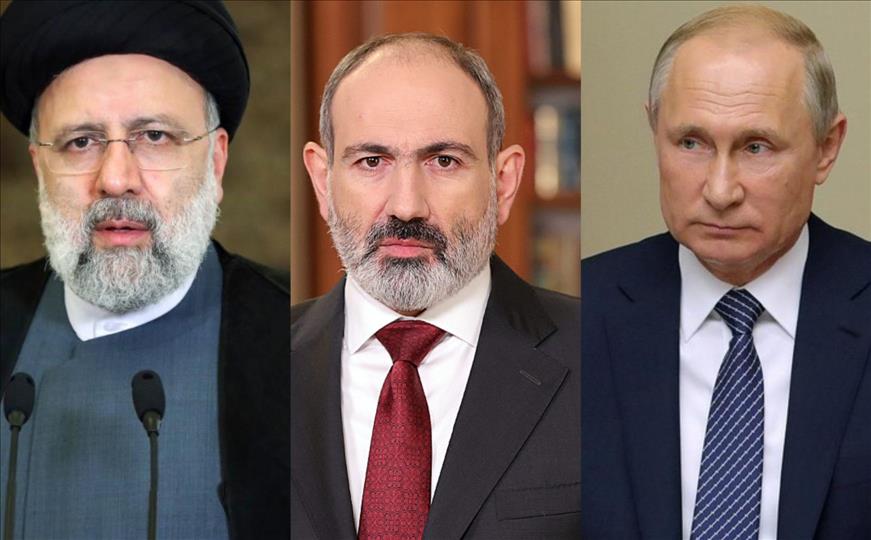
Tehran Not To Forgive Armenia's Refusal - PM Pashinyan's Forced Decision
The 2020 second Karabakh war, which transformed the region's realities, has heightened international interest. Three years ago, the President of the Republic of Azerbaijan suggested the "3+3" framework with the intention to develop a process comprising three South Caucasus countries and their neighbors - Russia, Turkey, and Iran. Despite Georgia's initial unwillingness to join, the first meeting in this style took place. However, given the rapid dynamics in the region, the value of this format for Tbilisi has substantially expanded.
Despite initial optimism that agreement on these organizational concerns would be reached quickly, global and regional processes, particularly Armenia's disruptive posture, appear to have brought the matter of additional meetings in the "3+3" format to a halt. However, the recent announcement of a conference of foreign ministers in the aforementioned format in Iran gives cause to assume that Armenia's participation in this meeting, even if only to give the impression of contributing to regional security, can help to clarify many concerns in the South Caucasus in the future.
In this context, two important issues can be underlined. The fact that Tehran, whose relations with Baku were tense after the second Karabakh war, will host the next meeting in this format can be seen as a message that the "ice" between Azerbaijan and Iran has already "melted".
Furthermore, Armenia, regarded as a Russian bastion, has agreed to this summit while expressing a willingness to shift away from the Kremlin and toward the West. Armenia's Prime Minister, Nikol Pashinyan, has made it apparent that he plans to distance himself from Russia by declining to attend the Commonwealth of Independent States (CIS) summit in Bishkek.
Pashinyan did not visit Kyrgyzstan, which would have taken only two hours, but instead went to Granada, which is far further away. Furthermore, Ararat Mirzoyan, Armenia's Foreign Minister, declined to attend the CIS Council of Foreign Ministers meeting in early October.
So, what made Armenia agree to the Iran meeting? Pashinyan appears to be realizing the impossibility of an immediate break with Russia, a departure from its area of influence. Otherwise, why would Armenia, which has avoided venues where Russia is present in recent days, accept to a conference in Tehran?
Iran's stance is another factor. Armenia most certainly received this proposition from Tehran and recognizes that rejecting it may result in the country losing Iran's support in the future. It's probable that Armenia realizes that separating itself from Iran for no obvious cause will be viewed badly by Tehran.
The essence of the "3+3" format lies in the approach of solving regional problems through regional actors. Iran has shown increased activity in recent days, as it acknowledges that the proposal of the President of the Republic of Azerbaijan is the most advantageous option for the region.
For this reason, Iranian Foreign Minister Hossein Amir-Abdollahian, during his meeting with the Secretary of the Security Council of Armenia, Armen Grigoryan, stated that the processes in the Caucasus can be resolved with the participation of local actors and neighbors in the region.
The "3+3" format was also discussed during a phone call between Russia's Foreign Minister Sergey Lavrov and his Iranian counterpart on October 10.
And finally, Armenia is obligated to engage in this framework, even if only to provide the appearance of contributing to regional security. However, if Pashinyan actually believes in this method, why does he continue to call on Strasbourg, Brussels, and Paris to intervene in the region's affairs? The solution to this question is likewise obvious. The Pashinyan government must finally recognize that the region's problems must and will be solved within the region, not beyond at all - in the European Parliament or Strasbourg.

Legal Disclaimer:
MENAFN provides the
information “as is” without warranty of any kind. We do not accept
any responsibility or liability for the accuracy, content, images,
videos, licenses, completeness, legality, or reliability of the information
contained in this article. If you have any complaints or copyright
issues related to this article, kindly contact the provider above.

















Comments
No comment